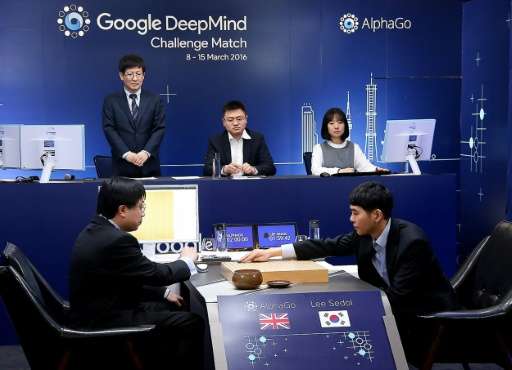Google computer wins final game against S. Korean Go master

A Google-developed computer programme had the last word Tuesday in its machine vs human challenge with South Korean Go grandmaster Lee Se-Dol, winning the final game for a sweeping 4-1 series victory.
The win was vindication for AlphaGo's creators, DeepMind, who had touted the programme as a new form of artificial intelligence (AI) capable of "intuitive" thought and with wide-ranging real-world applications.
"I'm kind of speechless, that was the most mind-blowing game experience so far," said DeepMind CEO Demis Hassabis.
"Early on ... it seemed that AlphaGo made quite a big mistake, but in the end it was able to get back into the match for an incredibly close, intense finish," Hassabis said.
"We're just kind of stunned really," he added.
A visibly upset Lee was left at the table with his head in his hands, after resigning at the end of a close-fought, five-hour battle with the AlphaGo programme.
After Lee had managed to pull one back for humanity in game four, AlphaGo was back on its best destructive form, using its deep neural networks to finally outwit the 33-year-old in a nerve-wracking end game.
'Shortcomings'
"I started off the match thinking that I had an advantage, but the fact that I was still defeated showed up my shortcomings," Lee told reporters afterwards.
The South Korean, who has 18 international titles under his belt and is widely considered one of the greatest Go players of the modern era, said he felt he had under-performed against a formidable, but beatable opponent.
"I think (AlphaGo) is still at a level that can be challenged by humans and in that sense, like I said earlier, I feel a bit disappointed," Lee said.
"It is different, there's no doubt. First of all, its not human. It took time for me to get used to its playing style," Lee said.
"It's not shaken up psychologically and stays focused right until the end," he added.
Described as the "match of the century" by local media, the series was closely watched by tens of millions of fans of the ancient board game—mostly in East Asia—as well as AI scientists.
The "machine vs human" element meant the games also made headlines around the world, with AlphaGo's winning performance hailed as a watershed for the future of AI.
The most famous AI victory to date came in 1997, when the IBM-developed supercomputer Deep Blue beat the then-world class chess champion Garry Kasparov.
AI holy grail
But Go, played for centuries mostly in Korea, Japan and China, had long remained the holy grail for AI developers due to its complexity and near-infinite number of potential configurations.
AlphaGo uses two sets of neural networks that allow it to crunch data in a more human-like fashion—dumping millions of potential moves that human players would instinctively know were pointless.
It also employs algorithms that allow it to learn and improve from matchplay experience.
DeepMind says the technology has far-ranging, real-world applications from making smartphones smarter to health care, although Hassabis said they had no clear idea what the next step might be.
"We've really just been focusing on the match until this moment," he told the post-match press conference.
"We think there are many things we can improve. Maybe in the next few months we'll be able to announce more concrete plans," he added.
Before the final game, South Korea's Go Association said it was awarding AlphaGo the highest Go grandmaster rank of "ninth dan", reserved for those whose ability at the ancient board game borders on "divinity."
© 2016 AFP




















